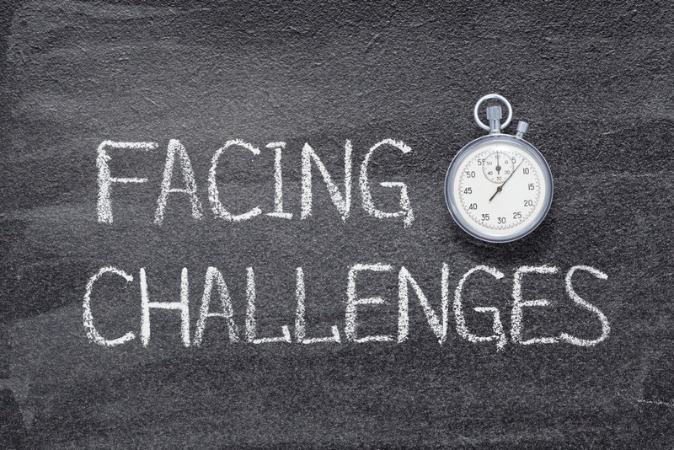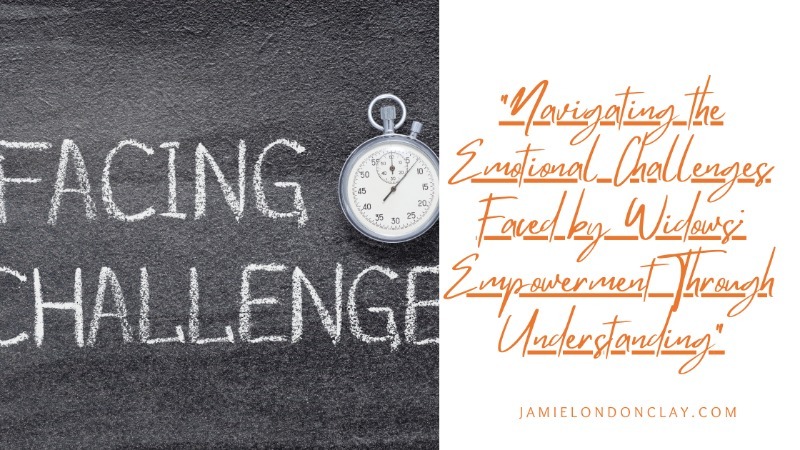
Navigating the Emotional Challenges Faced by Widows
Explore the emotional landscape of widowhood with this insightful article. Discover strategies for overcoming challenges and empowering your journey towards holistic development.
Welcome to “I Empower You to Empower You,” where my mission is to guide you through the transformative journey of self-empowerment.
Today, we dig into the emotional challenges faced by widows—a topic that touches the lives of many yet often remains covered in silence. With over 14 million widowed persons in the U.S. alone and nearly 70% of women likely to experience widowhood, it’s crucial to shed light on this profound life transition.
As someone who has been navigating the grief of losing my husband to rebuilding my identity, this journey is very personal, and I want to share with other widows and widowers how to navigate this process better. Here is more on my story!
Understanding the Emotional Landscape
Widowhood brings unique emotional challenges that can affect every aspect of life. From navigating grief to rebuilding one’s identity, the journey is as personal as it is universal.
The Statistics Behind the Struggle
Recent studies highlight the stark reality many widows face, with approximately 70% reporting intense feelings of loneliness. Moreover, the first year after losing a spouse sees around 75% of widows/widowers experiencing a major illness, underscoring the significant impact of this life event on one’s well-being.
Highlights: Young Widow Statistics
- In 2016, about 800,000 widows (er) under 45 were in the U.S.
- Around 75% of widows/widowers will experience a significant illness in the first year after their spouse’s death.
- Approximately 70% of widows will experience intense feelings of loneliness.
- About 60% of those who lose a spouse or life partner feel that loneliness is the biggest challenge to deal with.
- In 2019, the poverty rate among widows (er) aged 18-64 was 15.3%.
- Over 50% of marriages in the U.S. end in divorce, which can lead to young widowhood.
- A 2009 study showed that a widow’s risk of dying was 10% to 50% higher than that of a non-widow.
- One in three women in the U.S. will be widowed by age 65.
- 50% of widows experienced a loss of 50% or more income.
- 81% of widows reported a decline in social support in the six months following bereavement.
- 30.8% of widows in the U.K. were in relative poverty after their spouse’s death.
- Only 7% of the young widow(er)s remarry in Germany.
- 25% of young widows are diagnosed with mental health issues within a month of their spouse’s death.
- 1 in 5 widows experience clinical depression within the first year following a spouse’s death.
- 2.7 million people identified themselves as widowed in Australia in 2016.
- More than 20% of bereaved spouses describe their health as ‘poor.’
- Almost 60% of bereaved spouses experience significant symptoms of depression within the first few months.
- Young widows had a 5-9% higher mortality risk in the first 10 years after their husband’s death compared to non-bereaved.
- Bereaved spouses are at a 41% higher risk of developing cardiovascular disease.
- Widows with no close friends are twice as likely to die within the first six months after the husband’s death.
Strategies for Emotional Resilience
Building resilience is critical to facing the emotional challenges of widowhood. We’ll explore practical steps and mindful practices that can foster strength and healing.
Empowerment Through Community and Connection
No one should navigate widowhood alone. We’ll discuss the importance of community support and how connecting with others can provide comfort and understanding.
Holistic Development
A Path to Wholeness Holistic development is about nurturing all aspects of oneself. We’ll examine how focusing on physical, mental, and spiritual health can lead to a sense of wholeness and empowerment.
The Emotional Challenges Faced by Widows.
Widows face a multitude of emotional challenges as they navigate life after the loss of a spouse. Here are some of the critical difficulties they may encounter:
- Grief: The profound sense of loss is the primary emotional challenge, often accompanied by numbness, fear, and shock. This grief can shift a widow’s life in unexpected ways and may last for an extended period.
- Loneliness: Despite being surrounded by supportive friends and family; widows can experience intense feelings of isolation and loneliness. They may struggle with questions about whom to trust and rely on.
- Adjusting to Independence: Suddenly facing the world alone, widows must adapt to handling all their responsibilities alone, which can be overwhelming and lead to insecurity.
- Social Stigma: Widows may encounter discrimination and stigmatization based on their marital status, which can exacerbate feelings of isolation and affect their self-esteem.
- Economic Insecurity: The loss of a spouse can also mean a loss of financial stability, leading to stress and anxiety about the future.
- The Pressure of Single Parenthood: For those with children, the pressure of being the sole provider and caretaker can be immense.
- Survivor’s Guilt: Some widows may experience guilt for surviving their spouse or for any moments of happiness they feel after their loss.
- Identity Reformation: A widow may struggle with her sense of identity as she adjusts to life without her partner, which can be a source of existential distress.
These challenges are deeply personal and can vary significantly from one individual to another. Support systems, counseling, and community resources can play a crucial role in helping widows cope with these emotional hurdles.
How Can Widows Find Emotional Support?
Widows can find emotional support through various resources and communities designed to help them navigate their grief and rebuild their lives. Here are some avenues for support:
- Online Communities: Websites like The Sisterhood of Widows and subscribe to my blog “I Empower You to Empower You” offer a platform for widows to connect, share experiences, and find encouragement and guidance.
- Support Groups: Organizations such as The W Connection provide a network of widows helping each other through shared wisdom and unique challenges.
- Grief Counseling: Professional grief resources, including counseling and workshops, can offer structured support and a pathway to healing.
- Bereavement Groups: Many churches, hospice organizations, and funeral homes offer grief support groups tailored to widows’ needs.
- Social Connection: Engaging with family and friends for increased emotional support can help maintain a sense of connection.
- Therapeutic Guidance: Qualified counseling can assist in addressing the emotional challenges specific to widowhood.
These resources aim to provide widows with the support, education, and empowerment they need during one of their most challenging transitions.
What Are Some Coping Strategies for Widows?
Widows can employ a variety of coping strategies to navigate their grief and rebuild their lives. Here are some effective methods:
- Engage in Counseling: Seeking the guidance of a grief counselor can provide a safe environment to process emotions and develop coping mechanisms.
- Join Support Groups: Connecting with others who have experienced similar losses can offer comfort and understanding.
- Create Memorials: Honoring the memory of the deceased through keepsakes or memorials can provide a sense of closeness and comfort.
- Practice Self-Care: Prioritizing physical and emotional well-being is crucial during grieving.
- Build New Relationships: Forming new friendships and strengthening existing ones can help alleviate loneliness.
- Find Meaningful Activities: Engaging in activities that provide fulfillment and purpose can aid healing.
- Allow Yourself to Grieve: Recognizing and expressing grief is necessary for healing.
- Seek Financial Guidance: Consulting with a financial advisor can provide stability and peace of mind if financial concerns arise.
These strategies can help widows cope with their loss and move forward with resilience and hope.
In Conclusion: The Emotional Challenges Faced By Widows
As we conclude our exploration of the emotional challenges faced by widows, remember that you are not alone on this journey. To further support your path to empowerment, consider purchasing “The Complete You: A Guide on How to Be Made Whole.” This eBook is a valuable resource for anyone seeking to embrace holistic development and find fulfillment in every facet of life.
Visit jamielondonclay.com to explore products that will inspire and support you. As an affiliate, I receive a commission from purchases made through links in my blog posts and website, which helps me continue providing empowering content.
Be intentional about your empowerment and inspiration—click the link to Jamie London Clay and take the first step towards becoming the complete you.
Remember to subscribe to the blog, follow me on social media, share this article, and leave your thoughts in the comment section below. Let’s empower each other to rise above the challenges and emerge stronger.

Hello!
Terrifying statistics… Experiencing the loss of loved ones always brings about significant periods of sadness and grief.
Your mission to help enduring these hard periods is telling, your work is extremely important. I agree with your holistic development approach, every person must be a whole (alone…), and it’s achiveable.
I wish you the best on this important fight and work,
Respectfully,
Cortes
Cortes, thank you so much for your thoughtful comment and kind words. You’re right; navigating through the loss of loved ones is undeniably one of the most demanding challenges life throws our way. During these times of sadness and grief, the importance of holistic development truly shines through.
I’m deeply grateful for your support and encouragement towards my mission. Your belief in the significance of this work fuels my passion even more. Yes, achieving wholeness, even amidst solitude, is possible and essential for our well-being.
I’m sending my warmest wishes your way as well, Cortes. Let’s continue this journey together, supporting each other along the way.
Respectfully,
Jamie London-Clay